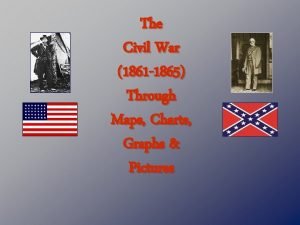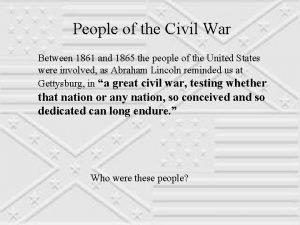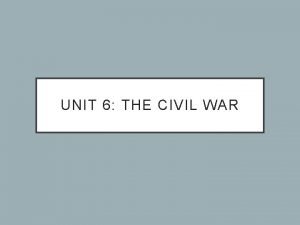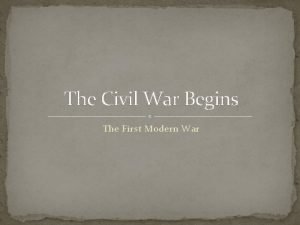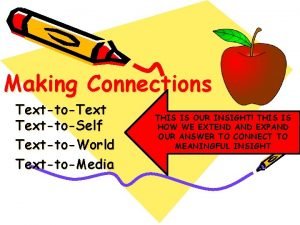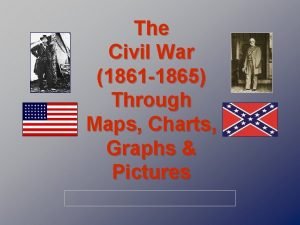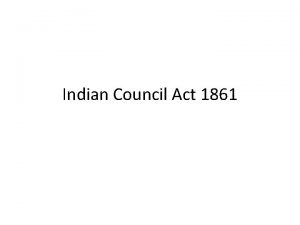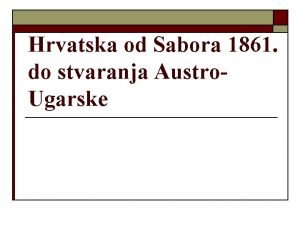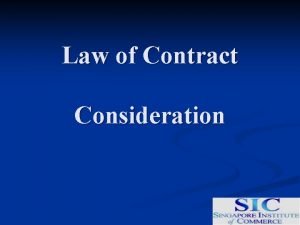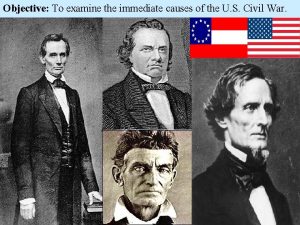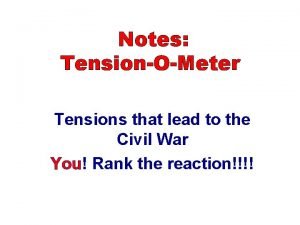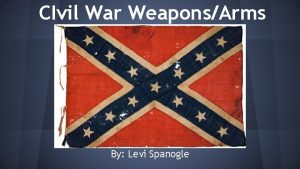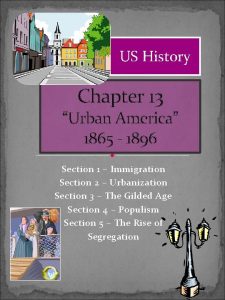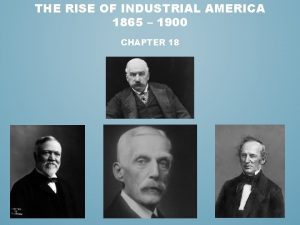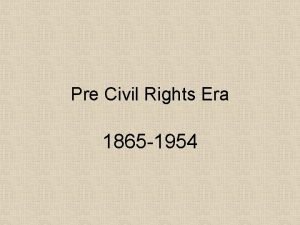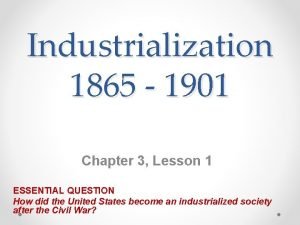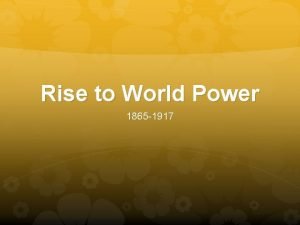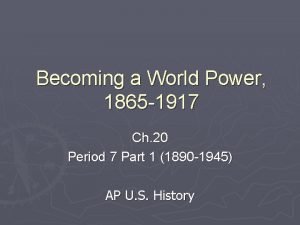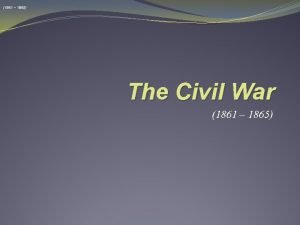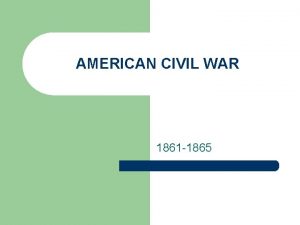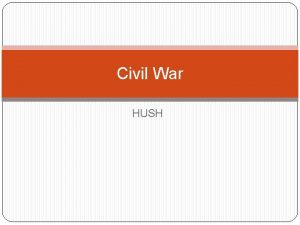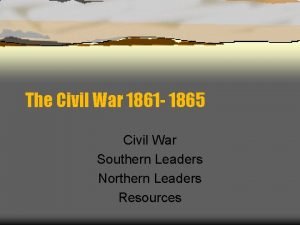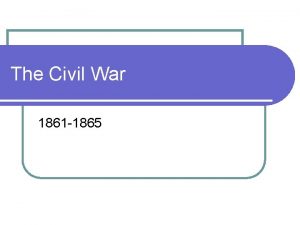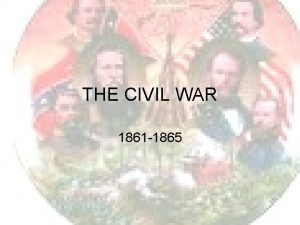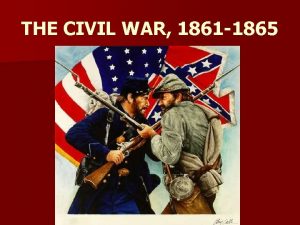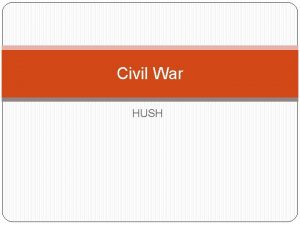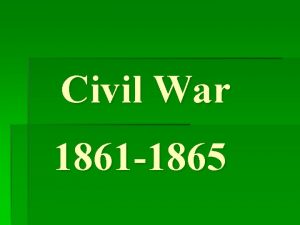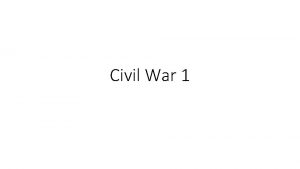Some Text American Civil War 1861 1865 American























- Slides: 23

Some Text American Civil War 1861 - 1865 American History Group 17 th November 2020

Today • Briefly describe an overview of the war • Review two important battles o Gettysburg, July 1863 o Sherman’s March to the Sea, Nov – Dec 1864 2

3

4

5

Robert E. Lee, George Meade, William Tecumseh Sherman, Ulysses S. Grant 6

Key Battles / Dates • Fort Sumter The war starts • First Bull Run Union pushes south but loses • Shiloh Grant cuts off key supply lines • Antietam or the Battle of Sharpsburg Lee pushes north, was halted but allowed to return south • Gettysburg Lee pushes his advantage, but loses • Vicksburg South cut in half and loses another key hub • The push south Sherman & Grant • Surrender at Appomattox • Lincoln Assassinated 12 April 1861 21 July 1861 6 -7 April 1862 17 Sep 1862 1 -3 July 1863 22 May – 4 July 1863 1864 9 April 1865 15 April 1865 7

Surrender at Appomattox 8

9

Battle of Gettysburg 1 st July – 3 rd July 1863 • The Battle of Gettysburg, fought in July 1863, was a Union victory that stopped Confederate General Robert E. Lee's second invasion of the North. • Deemed the turning point of the war. • More than 50, 000 men fell as casualties during the 3 -day battle, making it the bloodiest battle of the American Civil War. • On 19 November, President Lincoln used the dedication ceremony for the Gettysburg National Cemetery to honor the fallen Union soldiers and redefine the purpose of the war in historic Gettysburg Address. • This was a new kind of war, better weapons and strategies. At Gettysburg, the battlefields have been preserved – starting as soon as the battle finished. 10

Gettysburg, Pennsylvania 11

12

13

14

Lincoln’s Gettysburg Address – 19 th November 1863 Four score and seven years ago our fathers brought forth on this continent, a new nation, conceived in Liberty, and dedicated to the proposition that all men are created equal. Now we are engaged in a great civil war, testing whether that nation, or any nation so conceived and so dedicated, can long endure. We are met on a great battle-field of that war. We have come to dedicate a portion of that field, as a final resting place for those who here gave their lives that nation might live. It is altogether fitting and proper that we should do this. But, in a larger sense, we can not dedicate — we can not consecrate — we can not hallow — this ground. The brave men, living and dead, who struggled here, have consecrated it, far above our poor power to add or detract. The world will little note, nor long remember what we say here, but it can never forget what they did here. It is for us the living, rather, to be dedicated here to the unfinished work which they who fought here have thus far so nobly advanced. It is rather for us to be here dedicated to the great task remaining before us — that from these honored dead we take increased devotion to that cause for which they gave the last full measure of devotion — that we here highly resolve that these dead shall not have died in vain — that this nation, under God, shall have a new birth of freedom — and that government of the people, by the people, for the people, shall not perish from the earth. —Abraham Lincoln 15

16

Total War - A Scorched Earth Policy Sherman believed that the Confederacy derived its strength not from its fighting forces but from the material and moral support of sympathetic Southern whites. Factories, farms and railroads provided Confederate troops with the things they needed, he reasoned; and if he could destroy those things, the Confederate war effort would collapse. Meanwhile, his troops could undermine Southern morale by making life so unpleasant for Georgia’s civilians that they would demand an end to the war. The Yankees were “not only fighting hostile armies, but a hostile people, ” Sherman explained; as a result, they needed to “make old and young, rich and poor, feel the hard hand of war. ” 17

Sherman’s Plan After taking Atlanta on the 1 st Sept 1864 (a 4 month campaign which all but assured Lincoln’s re-election), Sherman embarked on a Total War / Scorched Earth strategy. From 15 Nov until 21 Dec, 1864, Sherman led 60, 000 soldiers on a 285 -mile march from Atlanta to Savannah, Georgia. The purpose of Sherman’s March to the Sea was to frighten Georgia’s civilian population into abandoning the Confederate cause. “Gone with the Wind” Scarlett O’Hara, Rhett Buter by David O Selznick & Victor Fleming 18

Sherman’s Plan Sherman’s soldiers did not destroy any of the towns in their path, but they stole food and livestock and burned the houses and barns of people who tried to fight back. They marched south toward Savannah in two wings, about 30 miles apart. Early in the march, 3, 500 Confederate cavalry started a skirmish that ended badly for the South. 650 Confederate soldiers were killed or wounded, compared to 62 Yankee casualties. Southern troops initiated no more battles. Instead, they fled South ahead of Sherman’s troops, wreaking their own havoc as they went: They wrecked bridges, chopped down trees and burned barns filled with provisions before the Union army could reach them. 19

The Union soldiers were just as unsparing. They raided farms and plantations, stealing and slaughtering cows, chickens, turkeys, sheep and hogs and taking as much other food – especially bread and potatoes – as they could carry. The marauding Yankees needed the supplies, but they also wanted to teach Georgians a lesson: “it isn’t so sweet to secede, ” one soldier wrote in a letter home, “as [they] thought it would be. ” Sherman’s troops arrived in Savannah on December 21, 1864, about three weeks after they left Atlanta. The city was undefended when they got there. (The 10, 000 Confederates who were supposed to be guarding it had already fled. ) Early in 1865, Sherman and his men left Savannah and pillaged and burned their way through South Carolina to Charleston. In April, the Confederacy surrendered and the war was over. 20

Major General William Tecumseh Sherman was a contradiction embodied. He eliminated Atlanta's war making potential and brought sheer destruction to Georgia, then offered generous surrender terms. His vision of hard war brought the Confederacy to its knees, but forestalled thousands of battlefield and civilian deaths. 21


23
 Civil war 1861/1862
Civil war 1861/1862 Civil war 1861/1862
Civil war 1861/1862 Sherman's neckties
Sherman's neckties Civil war first modern war
Civil war first modern war Chapter 16 lesson 2 challenges to slavery
Chapter 16 lesson 2 challenges to slavery Realism v naturalism
Realism v naturalism Text-to-media connection
Text-to-media connection American civil war battles map
American civil war battles map Features of indian council act 1861
Features of indian council act 1861 Unionistička stranka 1861
Unionistička stranka 1861 Price v easton (1833)
Price v easton (1833) John brown poster
John brown poster Tensionometer
Tensionometer Springfield model 1861 rifle facts
Springfield model 1861 rifle facts Civil rights and civil liberties webquest
Civil rights and civil liberties webquest Urban america 1865 to 1896
Urban america 1865 to 1896 St helen’s smelting co v tipping (1865)
St helen’s smelting co v tipping (1865) The rise of industrial america 1865-1900
The rise of industrial america 1865-1900 Four features of industrial manufacturing (1865-1900)
Four features of industrial manufacturing (1865-1900) 1954-1865
1954-1865 Industrialization 1865 to 1901
Industrialization 1865 to 1901 Becoming a world power 1865-1917
Becoming a world power 1865-1917 Impressionism characteristics
Impressionism characteristics Chapter 20 becoming a world power notes
Chapter 20 becoming a world power notes
